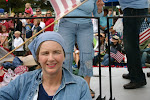Women Artists, Yaoi Manga
When publishers including DMP, Aurora/Deux, TokyoPop and Be Beautiful took a chance on yaoi manga, they played a critical role in exposing American audiences to the ground-breaking, envelope-pushing homoerotic (male-male) comics of many leading female Japanese artists including Naduki Koujima, Lily Hoshino, You Higuri, Kodaka Kazuma, Shiuko Kano, Fumi Yoshinaga, Makoto Tateno, Tooko Miyagi, and Youka Nitta. The result helped open up new avenues of artistic expression for women on a global scale.
Hoshino and Kazuma have both been hailed as queen of manga and queen of yaoi. However, while Kazuma's style is hard and mature, Hoshino's works are soft, sentimental, even cloying. Fans sometimes complain that Hoshino's drawings are barely distinguishable from heterosexual erotica--only the flat chests of her pretty boys give them away. There's little explicit sex or nudity but still enough to get her work rated 16-up or even 18-up by American publishers. Her style looks like something for kindergarteners but her manga--isn't. DMP/June has made available her collections Alone in My King's Harem and My Only King, while Yen publishes Love Quest.
Koujima is one of the most essential of all yaoi manga artists, thanks to Be Beautiful publishing her 2-vol. Selfish Love while DMP/June published Our Kingdom, currently stalled at vol. 6. Fans recognize many similarities between the two series, beginning with a rich schoolboy's aggressive, even violent, obsession with a poor one. Some critics complain about her limited style, but it's easily recognizable. Her other manga available in America include Great Place High School (DMP/June) and the combo of Naughy but Nice and Spicy but Sweet from Aurora/Deux.
During Be Beautiful's time on the American scene, they published what the company described as the "Cadillacs" of Japanese yaoi, including Kazuma's Kizuna (since picked up by DMP) and Nitta's Embracing Love and Sound of my Voice. (Nitta is retired from manga after a scandal involving her use of copywrited images without permission, making the Be Beautiful editions very valuble to collectors.)
Be Beautiful is also one of three publishers that have given us at least eight manga titles by Shuiko Kano, ranging from single volumes (such as Affair from DMP/801) to the three-volume series Kiss All the Boys and Yakuza in Love, both from Aurora/Deux. Play Boy Blues, from Be Beautiful, was a particularly odd choice because it was a continuation of a pair of Kano series that remain unavailable in English, so readers were being dropped into the middle of the two stories it contained.
Play Boy Blues promised an exploration of "Japan's erotic nightlife" with bar hosts (the male equivalent of bar hostesses or bar girls) whose business is women but whose pleasure is each other. To buy the premise of Play Boy Blues, however, a reader has to buy that a construction worker looks like a refugee from an eighties' big-hair band, and a middle-class college-educated athlete will voluntarily give up two careers--one in baseball, the other in his family business--to be a prostitute. The second story included in Play Boy Blues, "Manly Construction Training," also included construction workers who look like fashion models (as does Kano's I'm Not Your Stepping Stone and Maybe I'm Your Stepping Stone from DMP/801). The artist must have a thing about gay blue-collar men.
Play Boy Blues is currently available on Kindle, but still no explanation on the missing first manga. Wouldn't it be nice if Comic Con or Anime Expo invited Kano and these other women artists to America for a yaoi panel discussion?


0 Comments:
Post a Comment
Subscribe to Post Comments [Atom]
<< Home